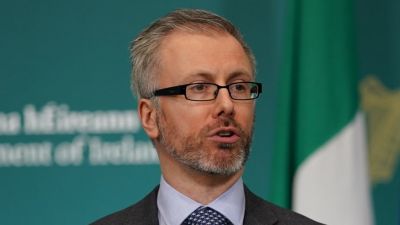A State-run reception agency for asylum seekers could help to solve current issues and plan for the long-term, according to the Irish Refugee Council and a policy officer for the ESRI.
While the current issues around a lack of accommodation for refugees have been well-publicised, it is a "dual-pronged issue", according to Keire Murphy.
Ms Murphy, of the Economic and Social Research Institute (ESRI), told BreakingNews.ie: "One issue is the short term emergency accommodation piece and local pushback to this. The other one is the long term integration and infrastructure building piece.
"In the short term, you have these massive challenges trying to accommodate people, you have people unable to move out of Direct Provision because there is no space in the housing market, as NGOs highlighted in the Joint Committee for Children, Equality, Disability, Integration and Youth meeting on Tuesday.
"A lot of the current challenges for this group are the same as for everybody else; a lack of housing supply, issues accessing healthcare, a lack of GPs, and a lack of public transport. Refugees and asylum seekers are being affected by the same issues affecting everybody else."
Several NGOs and TDs at the committee meeting on Tuesday highlighted that these issues in the mainstream system are exacerbating challenges for asylum seekers and the reception system because local communities feel that they're not able to access basic services, which can lead to tension when new people come in.
'Disconnected approach'
"In the long term, integration and the provision of tailored supports are important. Our last migrant integration strategy expired in 2021, and we've had no specific strategy for integrating asylum seekers and most refugees. NGOs have highlighted that there's been a disconnected approach to integration where people are sent to rural areas where there are very limited supports and usually no tailored supports for them."
Ms Murphy pointed out that there was a policy of not integrating asylum seekers until they were granted refugee status up until recently, when the government published the White Paper to End Direct Provision, which takes an ‘integration from day one’ approach.
In the committee meeting on Tuesday, Irish Refugee Council CEO Nick Henderson highlighted that research has shown that immediate integration supports upon arrival have a much bigger impact than when they are provided a few years down the line.
Ms Murphy pointed out that NGOs have highlighted the fact that challenges have been worsened by the State depending on the non-governmental sector for integration work, including linkages with state services "which is an unsustainable approach with little long-term funding going into the sector, which was heavily affected by cuts after 2008.
"This is highlighted in a forthcoming ESRI/European Migration Network report about labour market integration of asylum seekers".
Mr Henderson pointed out in the committee meeting that their experience in the last 20 years has shown that "Irish communities can be extremely powerful and can do amazing things", but that they need support and resources to achieve these.
Mark Ward TD also pointed to a Direct Provision centre that went into his local area, where there was initial resistance, but that people from the centre integrated well, becoming part of the football teams and the Tidy Towns committee. He said that the residents became so well integrated that when the centre was going to be closed down, the community went and rallied behind the residents to keep them there.
Communication
A lot of the recent protests against the accommodation of asylum seekers have been described by those involved as a result of a lack of communication from Government.
Plans are believed to be in place to improve communication with locals. Ms Murphy said this is important, however, "it can't be instead of structural solutions".
"If people raise concerns about a lack of GPs, just communicating that people are coming will not solve the problem that there aren't enough GPs, so it’s important to also work towards resolving these issues."
Ms Murphy pointed to other countries where reception agencies for asylum seekers are in place.
One example is the Central Agency for the Reception of Asylum Seekers (COA) in the Netherlands, which has over 5,000 staff.
A state agency for reception would be one approach that would enable long-term planning and capacity building.
"There are examples in other countries of really planned integration and reception system where reception centres are planned in advance, people are informed what will happen in a crisis. This is something they do in the Netherlands, for example, where they have arrangements for what happens if the numbers go up and local stakeholders are told how they will come out of that too.
"A state agency for reception would be one approach that would enable long-term planning and capacity building."
The IRC have suggested a state reception agency to government departments, according to Mr Henderson in the committee meeting but received pushback because we "wouldn’t get dividends within a year", meaning that it would not resolve the current lack of capacity in the system.
As a compromise, IRC recommended the appointment of a Refugee Response Director to coordinate between government departments and provide clear communication to the public.
Ms Murphy pointed to the role of local authorities in other contexts, which is hindered by a highly centralised system in Ireland.

According to the OECD, Ireland has the second most centralised civil service in the OECD, with 91 per cent of civil servants employed in central government, while at least 17 OECD countries employ a majority of their civil servants at a sub-national level.
"We're one of the most centralised countries in the OECD, so we don’t have the advantage of that key support element of the local authorities who could be a really big part of delivering additional services as needed and doing that communication piece.
"We have had more asylum seekers coming in since the 1990s, and we still have almost no State-owned and managed infrastructure to accommodate them."
Citing the Netherlands' example, Ms Murphy pointed out how state-managed accommodation can be more cost-effective than private options offered by systems like Direct Provision, according to the Dutch authorities, who said at a recent conference that in the Netherlands six months of private accommodation provision costs the same as 15 years of State-managed accommodation provision.







